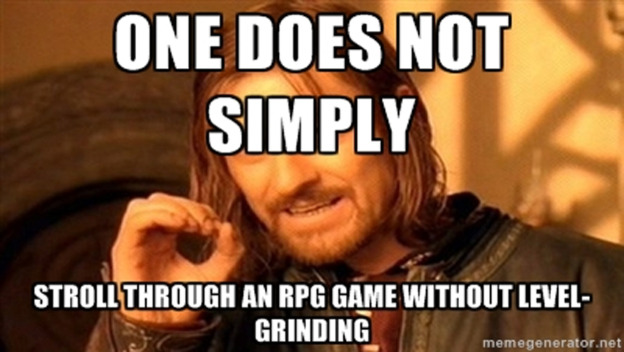As an RPG fan since the old NES days, there’s one question I’ve heard endlessly over the years: “How do you deal with the grind?” Practically every RPG demands players devote countless hours to repetitive battles in the hopes of eventually reaching that next level, learning one more skill, or getting to some unspecified plateau that will make the difference.
The thing is, grinding isn’t the grind it seems to be. Sure, it’s a tedious endeavor and affair that requires a significant amount of patience and devotion, but while it can seem like a lot of effort at the time, in retrospect, it doesn’t feel as monotonous as it should. In fact, if a game is designed well enough, sometimes the grind is unnoticeable.
Perhaps one of the most recent games where I didn’t even notice the grind–or that I had sunk in 97 hours of playtime– is Fire Emblem Awakening . The progression moves smoothly and swiftly, and there’s always some micro-goal being reached to make players feel like stars. Characters could have leveled up; a major story battle could have been cleared; a character may be able to upgrade to a better class or reclass to something new. Leveling up could have finally given you a skill you’ve desperately wanted, such as Galeforce. Maybe enough battles were experienced to up the group’s fame, leading to a new Renown reward. Characters could even have come closer to making friends or falling in love.
The important thing is, it feels like something is always happening in Fire Emblem Awakening . Though much of the game is using Reeking Boxes to generate random enemy encounters to grind characters into unstoppable forces, progress is always taking place, and micro-goals are being reached. It makes grinding seem more glamorous and even more addictive. “Just one more battle, and Gaius will reach level 20 and can upgrade to an Assassin.” “If I play 15 more minutes, then Lucina and Gerome will fall in love.” “Lissa is so close to learning Galeforce!” These thoughts keep winding through someone’s head as they play, and it gets to a point where the grind is nothing because every few minutes there’s some milestone or reward.
This tedious-free grinding is a trait shared with another series, one that’s getting a release in October. Pokemon is a master of the micro-goals. Whether it’s done by facing wild Pokemon or in-game trainers, grinding is a necessity. Gamers grind throughout a Pokemon game in the hopes of building up captured pets and making them the very best. If someone doesn’t have a guide constantly on hand, they’ll be left wondering if the next level could be the one that bestows an awesome new power or, perhaps, an anticipated evolution. Just a few more battles, and one more level, could mean reaching new heights of greatness and accomplishment.
Moreover, Pokemon is the kind of series where one or two more levels could mean the difference between victory and defeat. If a Pokemon’s stats go up just right, then in two levels, someone could defeat an opponent who was a force to be reckoned with moments before. Occasionally, a win after gaining a few levels is due to luck, but more often than not, it’s due to getting just enough of a boost to the attack or special attack statistics to make a move a little more effective. It’s immensely satisfying to see training pay off, especially so quickly, and to continue on and see Pokemon recruited at level 6, 10, or 15 grow into level 50 or 60 beasts with extraordinary power is gratifying.
Of course, the best example of small steps leading up to colossal victories is the Etrian Odyssey series. It’s the kind of game where a few levels can mean the difference between life and death in a dungeon, as party members could become just strong enough to survive or learn an essential skill. If the difficulty is high enough, a player managing to survive long enough in one area to get a party to level up once, perhaps twice, is deserving of praise. In this case, grinding and surviving is a sign of skill and intelligence.
That’s because the Etrian Odyssey games aren’t like ordinary RPGs when it comes to grinding. In the right dungeon, on certain difficulty levels, any battle could lead to a total wipeout. And if an F.O.E. enters the fray? Forget about it. If a player is going to grind, they have to play smart. Serious thought is required, and finding someone who’s beaten the game means meeting someone who’s smart, patient, and willing to put an extraordinary amount of time into making the most of the game.
Then, there are also the games where grinding success is all about seeing just how ridiculous you can make things or how badly you can break the game. NIS America’s Disgaea series strongly encourages obscene amounts of grinding, with players able to boost their characters up to level 9,999. Once that’s been hit, you can go ahead and reincarnate that character, starting them over at level one with slightly better stats than before; reincarnated characters also maintain their previous skills and weapon masteries. Effectively, someone with enough time can turn all of their characters into gods. Oh, the items can be made into gods as well, thanks to the ability to enter the dungeon inside of each item to capture its specialists, characters that boost certain stats, and to level up the piece of equipment.
I suppose it’s about bragging rights as well. The people who take their characters to the limit get special trophies. Disgaea 4 , for example, has Biggus Stickus for inflicting 10,000,000,000 damage, Bottom of the 9999th! for the first character who reaches level 9,999, and Master Crafter for getting a piece of equipment to level 300. It takes a lot of time and love for a gamer to spend that long to earn those accolades, and the trophies are a testament to how good the games are that some people actually manage to reach that pinnacle.
The sad thing is, some recent games are eliminating the need to grind. Free-to-play RPGs, and even major games like Tales of Xillia , offer microtransaction incentives that can offer immediate and instant gratification; Xillia does it in the form of an immediate level boost. It’s unfortunate because grinding is a great way to show how hard work, effort, and patience pay off.

Fortunately, some games are balancing the grind, offering the option to make everything easier for those who don’t have the time. But these titles also also provide enough challenge to satisfy those who aren’t going to cave in and purchase DLC that makes the game easier. Case in point is Shin Megami Tensei IV . The difficulty is punishing in the main game, even on the standard difficulty level, but paid DLC opens up new Challenge missions that have battles against enemies that drop experience-boosting items, extremely valuable trinkets, and point cards that allow new Burroughs apps to be unlocked quicker. Even though they are still providing a route to a faster payoff, people who purchase them still have to expend some effort to improve their characters, and they aren’t just having levels, money, and apps handed to them. Fire Emblem Awakening offers the same kind of level boosting, item acquiring, and money-earning DLC, giving people the opportunity to buy specific maps that will make grinding easier, but the game doesn’t just hand them upgrades.
There’s a beauty in repetition and a satisfaction that comes from a game where the amount of time you put in is directly proportional to the success players will achieve. I’d even go so far as to call it a moment of zen, a relaxing endeavor that allows players to focus on a single goal in a stress-free atmosphere for as long as they’d like, with guaranteed results coming, no matter how long they play.
